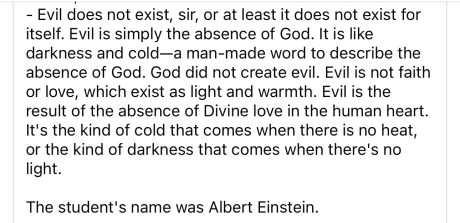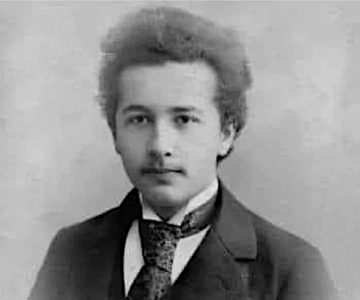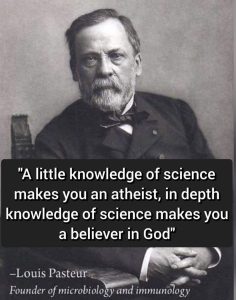A non-epic battle between the worldviews of legendary Swiss physicist Albert Einstein and a rural Christian named Tricia La Perch happened on Facebook a day or two ago.
The latter posted a false story from the mid to late 1890s, focusing on young Einstein, presumably in his teens, questioning a Swiss university professor about the nature and existence of evil.
La Perch’s Einstein story ends as follows:

My commentary, posted a half-hour ago:
First of all, Tricia La Perch looks, no offense, like some kind of rural, primitive, Bible-belt Christian. She claims to have once worked for Sony Music Entertainment, but look at her photo — a generic image of a Trump supporter who lives in some kind of suburban wasteland or trailer park and eats fried food.


Look at her Facebook-page photo of early morning sunlight streaming across the sky — a pious, glory-of-God image straight out of Sunday school.
But to bend over backwards, I will examine her Albert Einstein story, which seems to have been written by an under-educated 12 year old. And I should know — I used to be one.
Did a stenographer transcribe Einstein’s comments? A court stenographer who just happened to be in this class and just happened to have a stenographic recorder handy?
Never trust an allegedly true story that ignores the situational particulars — date, place (if true I presume this took place in a Swiss university, probably in Bern or Zurich), Einstein’s alleged age when it happened, etc.
Right off the top I was muttering “I don’t trust this…smells like bullshit…aimed at none-too-brights.”
A brilliant, well-educated student in a Zurich university in the 1890s (Einstein was born in 1879) would have never phrased a question to a professor with the words “can I ask a question?” He or she would say “may I ask,” etc.
And this student would never ask if cold was “a thing”. That’s a 21st Century social-media term.
Did Einstein write about this discussion in some published memoir or discovered diary? If so, was it allegedly written the next day? Or a month or two later? Or decades later? Did Einstein ever write about his life in any kind of personal vein?
Like all geniuses, Albert Einstein was a mystic. He was as imbued and enlightened as Steppenwolf, Siddartha, Krishna.
No one who has truly swum in the waters of mysticism has ever sincerely associated “God” with matters of earthly, fallible human morality — notions of good or bad, righteousness or evil, etc.
No mystic has ever denied or argued against the obvious fact of cosmic unity and intelligent design. But at the same time no serious mystic would ever associate “God” with boilerplate concepts of “good” and “evil.”
In short no mystic worth his or her salt would ever wade into the above-described hokum. Good and evil are simplistic children’s terms. Due respect, but there’s no reason to even begin to trust this story.


